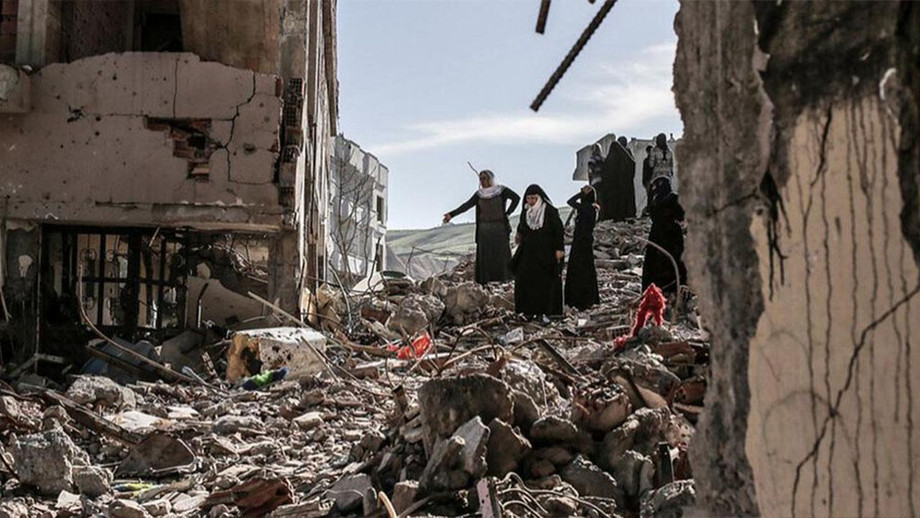On the ninth anniversary on the military curfew imposed on the Kurdish-majority city Cizre (Cizîr) in southeast Turkey and the following massacres by Turkish security forces, family members of people murdered during the time talk about the curfew and stated their commitment to seek justice for their killed family members.
On this day nine years ago, a curfew was imposed on the Kurdish-majority city Cizre (Cizîr) in southeast Turkey, which had a population of 115,000 people at that time. For 79 days, the Turkish army bombarded the area from both the ground and the air. Police and military took the whole city under fire, resulting in the destruction of the phone, electricity and water systems and besieging thousands of people.
Inhabitants looking for shelter in their basements were murdered in brutal ways. At least 259 people were killed during these days by Turkish security forces. At least 177 of them were killed when the Turkish military poured petrol into the basements where people had taken shelter from the refuge and lit fires, brutally burning the people inside, or when troops stormed the basements and shot those present. The bodies of 14 people killed in the basements at that time have still not been found. In 74 other cases, the severely burned bodies could not be identified.
These crime scenes have become etched in the memory of Kurdish society as ‘basements of horror’ and families of the deceased keep on seeking justice through legal channels, having faced rejection at the local courts and eventually at the Constitutional Court, which dismissed the claims, stating that no constitutional rights had been violated. Recently, families have applied to the European Court of Human Rights (ECHR).
One of the most prominent cases is the case of Mehmet Tunç, who was the co-chair of the Cizre People’s Assembly in 2016. His brother Orhan Tunç had been shot by security forces in Cizre and had fled injured into a cellar. Mehmet Tunç then filed a complaint with the ECHR and obtained an urgent decision that the Turkish state must use all its means to protect the right to life and physical integrity. The government in Ankara ignored the decision and let Orhan Tunç die. Mehmet Tunç also died a few days later in February 2016.
Family members of people killed during the curfew tell of the hardships they endured, the brutal killings of their loved ones and how they are continuing their struggle for justice.
Taybet Yılmaz, the mother of 23-year-old Selami Yılmaz, who was wounded during the curfews and died in the basement where he was waiting for an ambulance, stated that she learnt the news of her son’s death from television.
Yilmaz also explained the hardships she and her family experienced during the curfew. “We didn’t have tanks or cannons, the state did. We were tortured. We were imprisoned in houses for nearly three months. We could not take our heads out of the house. We were hungry and thirsty,” she explained.
Talking about the death of her son Selami, she said that when he was wounded he “could have been saved, but [the Turkish state] did not let us.” She emphasised that they will “never forget those days as long as we live” and that she does not “believe in the justice of this state” because she does not “expect justice from those who put us through this”.
Peoples’ Democratic Party (HDP) Cizre Municipality Councillor Abdulhamit Poçal was killed when the Turkish military opened fire on him while he was out on the streets of Cizre to collect the bodies of those who had been massacred.
Poçal’s wife, Aslıhan Poçal, stated that they had returned to the village because their houses were demolished during the curfew, but her husband stayed in the district in order to not leave the people. Aslıhan Poçal stated that she received the news that her husband was murdered while watching television and that she was not allowed to take the body of her dead husband and bury him.
Stating that she will never forget those days, she said, “That persecution is always in front of our eyes. I do not believe in the justice of this state. The justice that has not come until today will not come after this. The day innocent and sinless people were massacred, my belief in justice ended.”
Mahmut Tetik, the older brother of 35-year-old Ali Tetik, a father of five children who was murdered during the curfew, said that even though years have passed, the wounds are still not healed. Tetik said: “My brother alongside his wife and their five children were murdered in his house.”
He also emphasised that “We did not receive justice from this state. What was done to us should not have been accepted. We will not forget those days. It would be misleading to expect justice in this system. There is no justice in this system.”
“But we will always stand against this persecution and we will not forget this persecution,” he concluded, highlighting his commitment to continue the fight for justice for his brother and his family.


